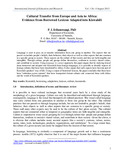| dc.contributor.author | Iribemwangi, P I | |
| dc.date.accessioned | 2015-07-20T07:22:24Z | |
| dc.date.available | 2015-07-20T07:22:24Z | |
| dc.date.issued | 2013-08 | |
| dc.identifier.citation | Iribemwangi, P. I. (2013). Cultural Transfer from Europe and Asia to Africa: Evidence from Borrowed Lexicon Adapted into Kiswahili. International Journal of Education and Research Vol. 1 No, 8. | en_US |
| dc.identifier.uri | http://www.ijern.com/journal/August-2013/32.pdf | |
| dc.identifier.uri | http://hdl.handle.net/11295/88272 | |
| dc.description.abstract | Language is used to pass on or transfer informatio
n from one group to another. The aspects that are
passed on include people’s beliefs, their behavior, th
eir objects as well as other aspects that are common
to a specific group or society. These as
pects are the culture of that soci
ety and they are both tangible and
intangible. Through culture, people and groups define
themselves, conform to so
ciety's shared values,
and contribute to society. Using
language in contact
approach, this paper argues that by studying lexical
items borrowed and adapted into Kiswahili from forei
gn languages, it is possible to identify aspects of
foreign cultures that have been transferred to Africa. It
also argues that such aspects have become part of
Kiswahili speakers’ way of life. Using a corpus of bor
rowed lexicon, the paper concludes that there have
been “unbroken ocean currents” that
have transported distant cultures and connected them with Africa
and the world of Kiswahili speakers. | en_US |
| dc.language.iso | en | en_US |
| dc.publisher | University of Nairobi | en_US |
| dc.subject | Kiswahili, borrowing, adaptation, lexicon, culture, loanwords | en_US |
| dc.title | Cultural transfer from Europe and Asia to Africa: Evidence from borrowed lexicon adapted into Kiswahili | en_US |
| dc.type | Article | en_US |
| dc.type.material | en_US | en_US |

